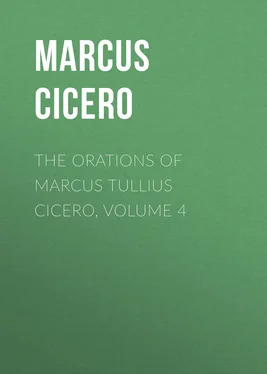Marcus Cicero - The Orations of Marcus Tullius Cicero, Volume 4
Здесь есть возможность читать онлайн «Marcus Cicero - The Orations of Marcus Tullius Cicero, Volume 4» — ознакомительный отрывок электронной книги совершенно бесплатно, а после прочтения отрывка купить полную версию. В некоторых случаях можно слушать аудио, скачать через торрент в формате fb2 и присутствует краткое содержание. Жанр: foreign_antique, Философия, foreign_edu, на английском языке. Описание произведения, (предисловие) а так же отзывы посетителей доступны на портале библиотеки ЛибКат.
- Название:The Orations of Marcus Tullius Cicero, Volume 4
- Автор:
- Жанр:
- Год:неизвестен
- ISBN:нет данных
- Рейтинг книги:3 / 5. Голосов: 1
-
Избранное:Добавить в избранное
- Отзывы:
-
Ваша оценка:
- 60
- 1
- 2
- 3
- 4
- 5
The Orations of Marcus Tullius Cicero, Volume 4: краткое содержание, описание и аннотация
Предлагаем к чтению аннотацию, описание, краткое содержание или предисловие (зависит от того, что написал сам автор книги «The Orations of Marcus Tullius Cicero, Volume 4»). Если вы не нашли необходимую информацию о книге — напишите в комментариях, мы постараемся отыскать её.
The Orations of Marcus Tullius Cicero, Volume 4 — читать онлайн ознакомительный отрывок
Ниже представлен текст книги, разбитый по страницам. Система сохранения места последней прочитанной страницы, позволяет с удобством читать онлайн бесплатно книгу «The Orations of Marcus Tullius Cicero, Volume 4», без необходимости каждый раз заново искать на чём Вы остановились. Поставьте закладку, и сможете в любой момент перейти на страницу, на которой закончили чтение.
Интервал:
Закладка:
Therefore, when I saw that a nefarious war was waged against the republic, I thought that no delay ought to be interposed to our pursuit of Marcus Antonius; and I gave my vote that we ought to pursue with war that most audacious man, who, having committed many atrocious crimes before, was at this moment attacking a general of the Roman people, and besieging your most faithful and gallant colony; and that a state of civil war ought to be proclaimed; and I said further, that my opinion was that a suspension of the ordinary forms of justice should be declared, and that the garb of war should be assumed by the citizens, in order that all men might apply themselves with more activity and energy to avenging the injuries of the republic, if they saw that all the emblems of a regular war had been adopted by the senate. Therefore, this opinion of mine, O Romans, prevailed so much for three days, that although no division was come to, still all, except a very few, appeared inclined to agree with me. But to-day—I know not owing to what circumstance—the senate was more indulgent. For the majority decided on our making experiment, by means of ambassadors, how much influence the authority of the senate and your unanimity will have upon Antonius.
II. I am well aware, O Romans, that this decision is disapproved of by you; and reasonably too. For to whom are we sending ambassadors? Is it not to him who, after having dissipated and squandered the public money, and imposed laws on the Roman people by violence and in violation of the auspices,—after having put the assembly of the people to flight and besieged the senate, sent for the legions from Brundusium to oppress the republic? who, when deserted by them, has invaded Gaul with a troop of banditti? who is attacking Brutus? who is besieging Mutina? How can you offer conditions to, or expect equity from, or send an embassy to, or, in short, have anything in common with, this gladiator? although, O Romans, it is not an embassy, but a denunciation of war if he does not obey. For the decree has been drawn up as if ambassadors were being sent to Hannibal. For men are sent to order him not to attack the consul elect, not to besiege Mutina, not to lay waste the province, not to enlist troops, but to submit himself to the power of the senate and people of Rome. No doubt he is a likely man to obey this injunction, and to submit to the power of the conscript fathers and to yours, who has never even had any mastery over himself. For what has he ever done that showed any discretion, being always led away wherever his lust, or his levity, or his frenzy, or his drunkenness has hurried him? He has always been under the dominion of two very dissimilar classes of men, pimps and robbers; he is so fond of domestic adulteries and forensic murders, that he would rather obey a most covetous woman than the senate and people of Rome.
III. Therefore, I will do now before you what I have just done in the senate. I call you to witness, I give notice, I predict beforehand, that Marcus Antonius will do nothing whatever of those things which the ambassadors are commissioned to command him to do; but that he will lay waste the lands, and besiege Mutina and enlist soldiers, wherever he can. For he is a man who has at all times despised the judgment and authority of the senate, and your inclinations and power. Will he do what it has been just now decreed that he shall do,—lead his army back across the Rubicon, which is the frontier of Gaul, and yet at the same time not come nearer Rome than two hundred miles? will he obey this notice? will he allow himself to be confined by the river Rubicon and by the limit of two hundred miles? Antonius is not that sort of man. For if he had been, he would never have allowed matters to come to such a pass, as for the senate to give him notice, as it did to Hannibal at the beginning of the Punic war not to attack Saguntum. But what ignominy it is to be called away from Mutina, and at the same time to be forbidden to approach the city as if he were some fatal conflagration! what an opinion is this for the senate to have of a man! What? As to the commission which is given to the ambassadors to visit Decimus Brutus and his soldiers, and to inform them that their excellent zeal in behalf of, and services done to the republic, are acceptable to the senate and people of Rome, and that that conduct shall tend to their great glory and to their great honour; do you think that Antonius will permit the ambassadors to enter Mutina? and to depart from thence in safety? He never will allow it, believe me. I know the violence of the man, I know his impudence, I know his audacity.
Nor, indeed, ought we to think of him as of a human being, but as of a most ill-omened beast. And as this is the case, the decree which the senate has passed is not wholly improper. The embassy has some severity in it; I only wish it had no delay. For as in the conduct of almost every affair slowness and procrastination are hateful, so above all things does this war require promptness of action. We must assist Decimus Brutus; we must collect all our forces from all quarters; we cannot lose a single hour in effecting the deliverance of such a citizen without wickedness. Was it not in his power, if he had considered Antonius a consul, and Gaul the province of Antonius, to have given over the legions and the province to Antonius? and to return home himself? and to celebrate a triumph? and to be the first man in this body to deliver his opinion, until he entered on his magistracy? What was the difficulty of doing that? But as he remembered that he was Brutus, and that he was born for your freedom, not for his own tranquillity, what else did he do but—as I may almost say—put his own body in the way to prevent Antonius from entering Gaul? Ought we then to send ambassadors to this man, or legions? However, we will say nothing of what is past. Let the ambassadors hasten, as I see that they are about to do. Do you prepare your robes of war. For it has been decreed, that, if he does not obey the authority of the senate, we are all to betake our selves to our military dress. And we shall have to do so. He will never obey. And we shall lament that we have lost so many days, when we might have been doing something.
IV I have no fear, O Romans, that when Antonius hears that I have asserted, both in the senate and in the assembly of the people, that he never will submit himself to the power of the senate, he will, for the sake of disproving my words, and making me to appeal to have had no foresight, alter his behaviour and obey the senate. He will never do so. He will not grudge me this part of my reputation, he will prefer letting me be thought wise by you to being thought modest himself. Need I say more? Even if he were willing to do so himself, do you think that his brother Lucius would permit him? It has been reported that lately at Tibur, when Marcus Antonius appeared to him to be wavering, he, Lucius, threatened his brother with death. And do we suppose that the orders of the senate, and the words of the ambassadors, will be listened to by this Asiatic gladiator? It will be impossible for him to be separated from a brother, especially from one of so much authority. For he is another Africanus among them. He is considered of more influence than Lucius Trebellius, of more than Titus Plancus [lacuna] a noble young man. As for Plancus, who, having been condemned by the unanimous vote of every one, amid the overpowering applause of you yourselves, somehow or other got mixed up in this crowd, and returned with a countenance so sorrowful, that he appeared to have been dragged back rather than to have returned, he despises him to such degree, as if he were interdicted from fire and water. At times he says that that man who set the senate house on fire has no right to a place in the senate house. For at this moment he is exceedingly in love with Trebellius. He hated him some time ago, when he was opposing an abolition of debts, but now he delights in him, ever since he has seen that Trebellius himself cannot continue in safety without an abolition of debts. For I think that you have heard, O Romans, what indeed you may possibly have seen, that the sureties and creditors of Lucius Trebellius meet every day. Oh confidence! for I imagine that Trebellius has taken this surname, what can be greater confidence than defrauding one's creditors? than flying from one's house? than, because of one's debts, being forced to go to war? What has become of the applauses which he received on the occasion of Caesar's triumph, and often at the games? Where is the aedileship that was conferred on him by the zealous efforts of all good men? who is there who does not now think that he acted virtuously by accident?
Читать дальшеИнтервал:
Закладка:
Похожие книги на «The Orations of Marcus Tullius Cicero, Volume 4»
Представляем Вашему вниманию похожие книги на «The Orations of Marcus Tullius Cicero, Volume 4» списком для выбора. Мы отобрали схожую по названию и смыслу литературу в надежде предоставить читателям больше вариантов отыскать новые, интересные, ещё непрочитанные произведения.
Обсуждение, отзывы о книге «The Orations of Marcus Tullius Cicero, Volume 4» и просто собственные мнения читателей. Оставьте ваши комментарии, напишите, что Вы думаете о произведении, его смысле или главных героях. Укажите что конкретно понравилось, а что нет, и почему Вы так считаете.












